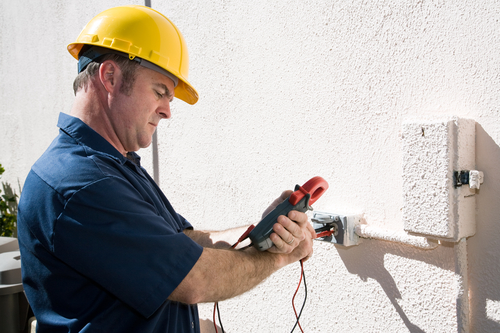When it comes to electrical problems, ignorance is not bliss. Unlike a struggling air conditioner or a sagging roof, a home electrical system works perfectly fine—until it doesn’t. An occasional electrical inspection can spot seriously dangerous issues like short circuits, frayed wiring, ungrounded outlets, and missing safety features.
Assiduous home inspectors look for all kinds of issues from the foundation to the roof. Electrical components are just a small part of the home inspector’s job. For a deeper dive into potential hazards that need to be addressed, get an electrical inspection in addition to a general inspection.
Do Home Inspections Cover Electrical Systems?

Home inspectors look at visible parts of the home. Obviously, much of your electrical system is behind the walls. A routine home inspection can include the service panel and circuit breaker switches, GFCI outlet testing, and other readily accessible parts.
If you’re concerned about the health or age of the wiring, you need a licensed electrical inspection. Home inspectors cannot open the walls. They would only be able to see visible wiring, such as in the attic.
Also, home inspectors should have a working knowledge of electrical standards, but they are not and do not claim to be electrical experts. If they cite a potential electrical problem, get it looked at by a licensed residential electrician before committing to a repair.
How Often Do You Need an Electrical Inspection?
Most people only think of getting an electrical inspection when buying a home. After all, electrical systems can last decades, so it’s not an annual necessity.
However, there are many other scenarios when you should get an electrical inspection:
- After a flood or plumbing leak
- If you are unsure how old your home electrical wiring is
- When planning home remodeling
- When adding major appliances
- To solve constant flickering lights, dim lights, or tripped breakers
- For safety (look for signs you need electrical repair)
Are Electrical Inspection Repairs Expensive?
Homeowners are often afraid that an electrician will tell them they need to rewire the whole house. That’s not often the case, though. And when it is, you really do need to do it. Home rewiring costs a few thousand dollars, but it’s necessary to avoid a catastrophic fire.
The common problems and code violations uncovered by an electrical inspection mostly cost somewhere between a few dollars and a couple hundred dollars. This includes important fixes for everyday items like wall outlets, AFCI breakers, miswired light switches, and improperly sized breaker switches.
The bottom line is that most electrical inspection repairs cost very little compared to the safety and peace of mind they bring, and even the most expensive electrical repairs cost far less than losing your house or your health.

